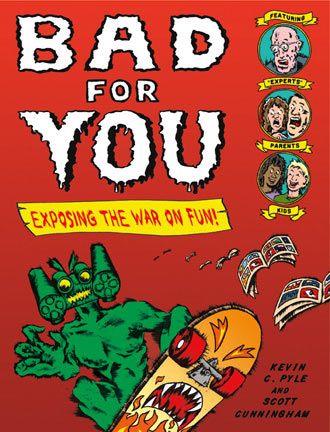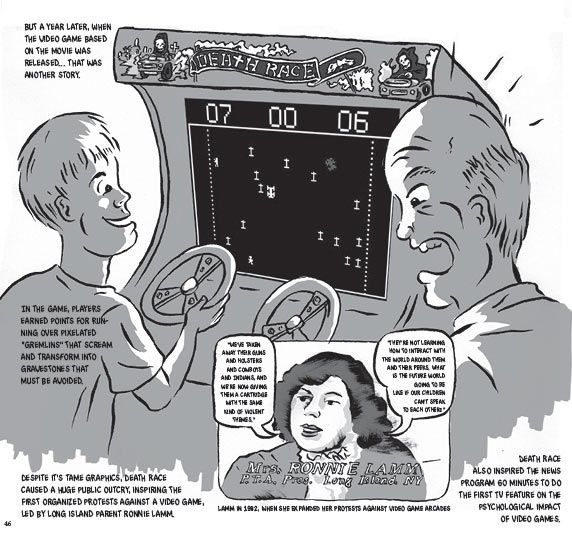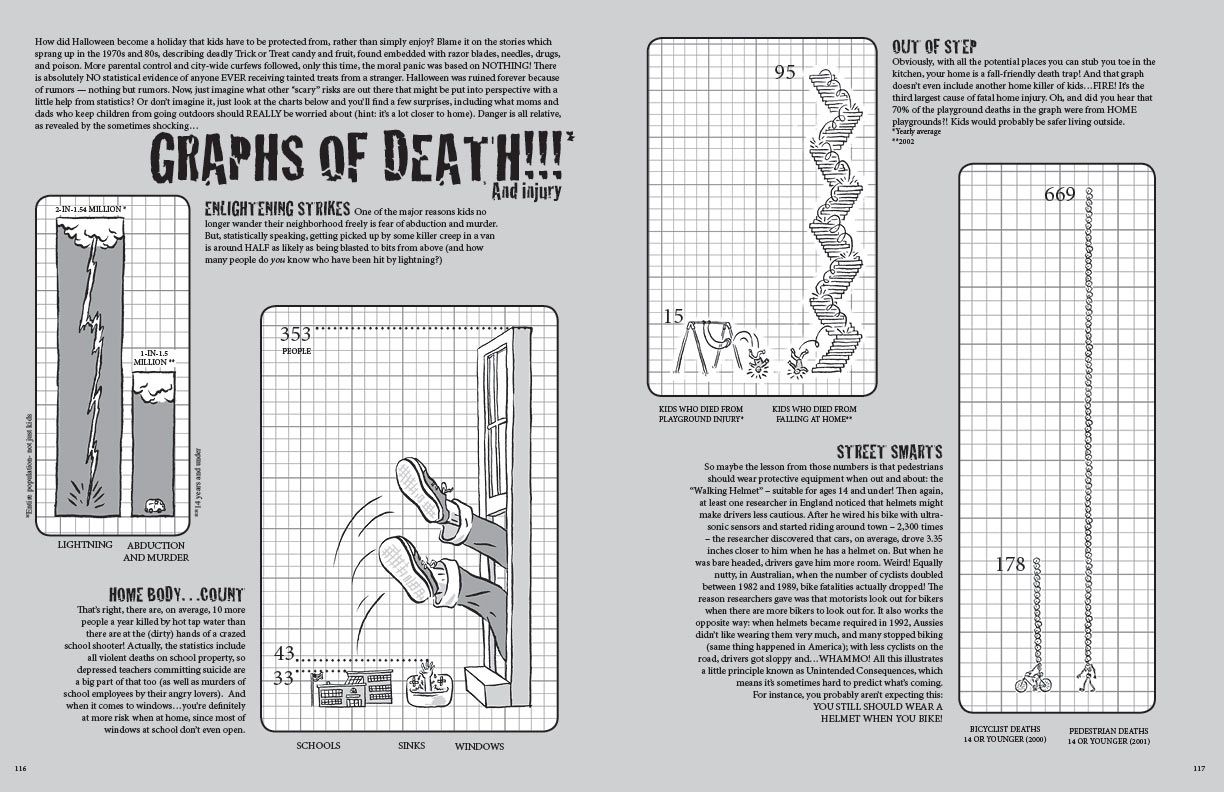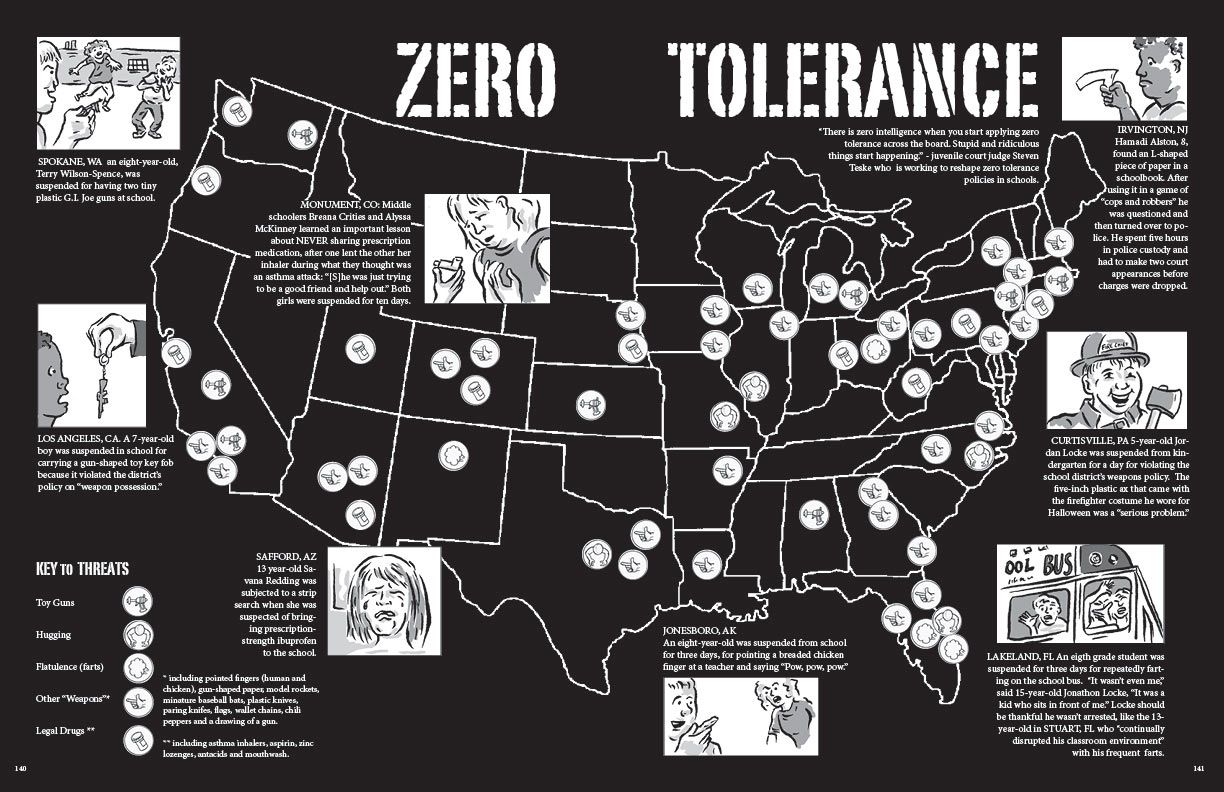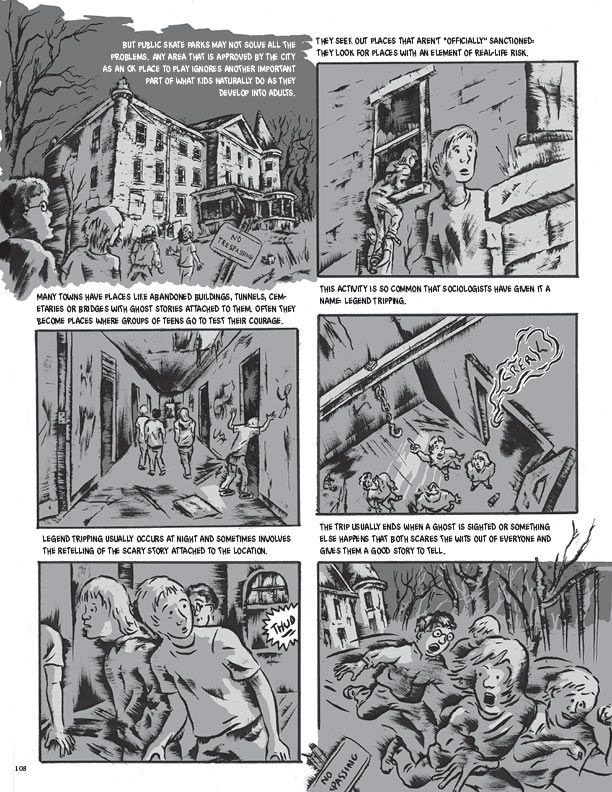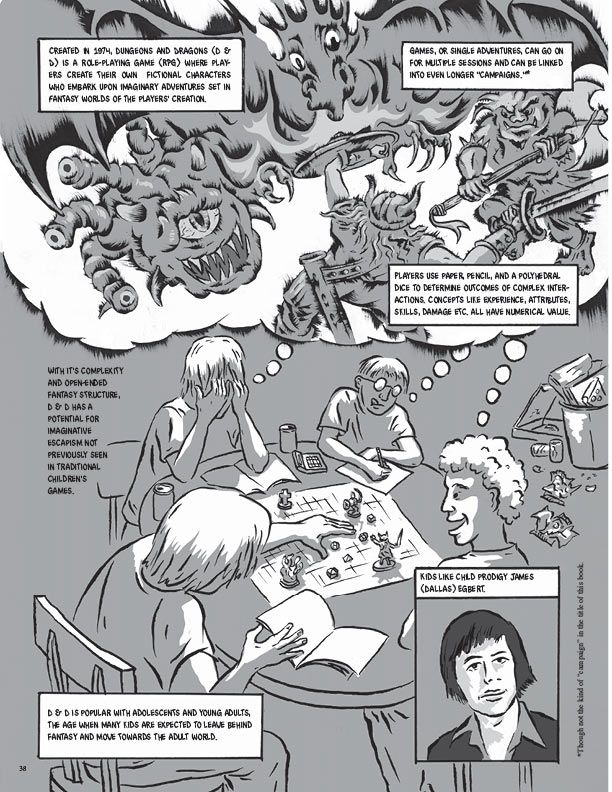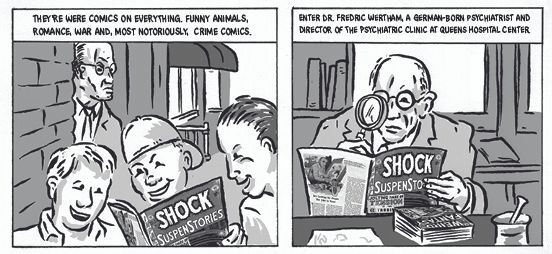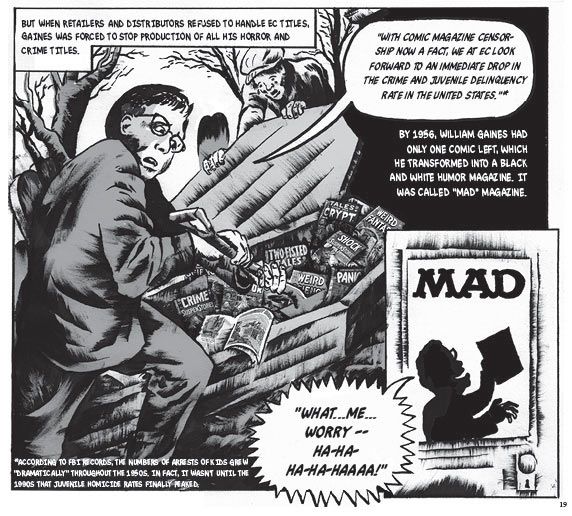Kevin Pyle and Scott Cunningham have had long careers woking in fiction and nonfiction comics, the former crafting a series of graphic novels aimed at the young adult market in recent years, like "Katman" and "Take What You Can Carry." Meanwhile, Cunningham has written a long series of comics for numerous publishers, ranging from miniseries and short stories for Vertigo, "Scooby-Doo" and "MAD Magazine."
Their new project, on sale now, is "Bad For You: Exposing the War on Fun." The book tackles the many panics that have taken place throughout modern history, by adults horrified and troubled by what kids are doing. "Bad for You" highlights a number of examples that are familiar to those of us who grew up in the past several decades -- like comic books and video games -- but they also make the point that this isn't a recent phenomenon and try to get at the real cause for these viral panics.
CBR News: What is "Bad For You?"
Scott Cunningham: Good question. Is it a comic? A graphic novel? An illustrated history about kids? A research paper with pictures? A survey of no-fun officialdom. Why, it's all that and more.
Kevin Pyle: It covers a whole range of topics: comic books, banned books, Dungeons and Dragons, video games, all the current tech-hysteria and some of the more outrageous incidents of school discipline, like suspensions for using a chicken finger as an imaginary gun. It's a cultural history combined with some investigation of what sparked these panics and if the fear is justified by the facts.
Cunningham: And the thing that makes it all hang together is the theme: If society ever worried that something was bad for you -- that "you" mainly being a kid -- then Kevin and I tried to cram it into this book. And then, to look at it closely to see if this thing really was bad for you. Guess what, most of them weren't!
Where did the idea for the book originate?
Pyle: Actually, out of a conversation with my editor at Holt about my previous book, "Take What You Can Carry." Half that story takes place in a Japanese-American internment camp. As I remember it, we were talking about how there are moments throughout American history when rights we take for granted are temporarily suspended, or in danger, and I said something like, "Like with the comics burnings in the fifties" -- referencing how folks like Dr. Wertham whipped up hysteria about the violent content in comics and how that led to congressional hearings and actual public burnings of comics.
She hadn't heard that history and thought kids would find it fascinating. That planted the idea in my head, and as I thought about things from my own childhood, like being a despised skate rat or being puzzled at my parent's concern over the hours I "wasted" at the video arcade, a history started to fall into place.
How did the two of you end up connecting?
Pyle: Scott and I have known each other a long time and he's been the first reader of a lot of my work. We co-edited an issue of "World War 3 illustrated" on Prisons that I'm really proud of. My original conception of the book had it feeling something like an issue of "MAD Magazine" on the subject of adult hysteria. I wasn't entirely sure I had the author voice for that, but I knew Scott did from his work on MadKids and other things. While that conception of the book changed a bit in the process, it turned out well because Scott did the bulk of preliminary research while I was finishing up my previous book.
Kevin I know you've made some nonfiction comics before. Scott, what about you? And can you guys talk a little about the difference working on nonfiction vs fiction?
Cunningham: I do nonfiction work for "World War 3." Not comics, instead illustrated text -- sometimes illustrated by others. I have something in the new issue of "WW3" on Hell that's a little like the text pieces in "Bad For You" with, like, eleven or twelve illustrators.
Pyle: I think the nonfiction work is sometimes more difficult because you're working within the confines of the available information. The flip side to that though is that "stranger than fiction" feeling it gives you when you come across just the right piece of information.
Cunningham: How you gather the pieces that will make up a nonfiction piece is very different than how you gather the pieces together for a personal comic. You're digging around into articles and archives instead of for ideas inside your head. But how you put those pieces together is the same. You're still trying to create a compelling narrative.
Pyle: As an illustrator, it's at times a whole different mindset coming up with an image that plays off the text rather than moves the story sequentially or provides narrative information.
Cunningham: Actually, many fiction comics start with research, like Kevin's "Take What You Can Carry," or when I did my four book miniseries for Vertigo, "Congo Bill." I did a ton of research into the Congo and the political situation there at the time. I even tried to make all my "Scooby-Doo" comics fact-based.
A lot of people will know many of the more recent examples of how Dungeons and Dragons, video games, Harry Potter, and playgrounds are all supposedly dangerous and horrible. I was fascinated to learn that chess was considered troubling in the nineteenth century. Was there anything that really surprised and shocked you as you researched this?
Cunningham: Lots! That's what we tried to do with the book, was pick out the most shocking things we could, and there were plenty to pick from over the last thousand years. In the book, there's one essay from the 1800s by a guy who warns kids that they should stop reading cheap pulp novels or they might end up like John Wilkes Booth -- killing a President! There's a whole range of things, like the story about a kid suspended from school for passing gas on the bus! That's recent.
Pyle: I was surprised by the sheer volume of YouTube videos documenting violent interactions between skateboarders and cops or security guards. It's practically a genre onto itself.
Cunningham: You know, maybe the most shocking thing for me was finding out over and over that there's not a lot of good research -- or any, sometimes -- that shows that most of this stuff is actually "Bad For You!" Especially passing gas on the bus. Unless you're the one sitting next to the kid doing the passing.
Do you think hysteria has increased in recent decades? If so, why do you think that is?
Pyle: I think some of it has to do with how alarmist and sensationalized our media has become -- especially TV. So many newscasts throw out provocative statements, often phrased as questions like, "Do YOU know who your child has friended on Facebook?!" But they never dig in to report actual research. Like, for instance, the recent Pew study showing that kids are actually more sophisticated about their privacy on the Internet than most adults assume.
Cunningham: Agreed. The big difference now is the media echo chamber -- which is TV and Internet driven. It amps up the hysteria, but it also seems to dissipate quickly. I think that will probably happen with the latest youth-based panic called The Knockout Game.
So what are the two of you working on next?
Pyle: In the last several years, I've often cycled back and forth between working on longer graphic novels and short, pamphlet comics for activist groups. While I was finishing up "Bad For You" I did a bilingual one on wage theft in Houston. It told the stories of workers who had their wages stolen and informed others about what their rights are. It was distributed by a worker center in advance of a stricter law passing the city council. So If the funding comes through I'm going to do another one on minimum wage and living wage issues. I'm also excited about a short piece in the current Death-themed issue of "World War 3 Illustrated." It's sort of a free-association graphic essay on "Memento Mori" -- artwork meant to remind us of mortality. I actually had three or four other ideas for death-related graphic essays that I'm excited about exploring.
I've also been writing a prose novel, which is really a blast. There's something about just letting the words flow, not editing them to gestalt with images, that is currently very satisfying for me. I'm enjoying it so much that it must be bad for me.
Cunningham: I'm working on text-based pieces in the "Bad For You" style that Kevin will illustrate, something on Valentine's Day school bans on hugging, candy and exchanging cards. Also something on the aforementioned Knockout Game. The working title for the piece is "The Name Game," since we think it's the naming of the activity that helps to feed the media attention to what would otherwise be identified as just another random act of violence. By giving it a name, you identify the activity as something new -- but random acts of violence have been around as long as, well, as long as people have been around. And since government stats show no increase in youth violence, the panic is caused -- literally -- by focusing attention on it.
We're hoping to pitch these as posts on other websites to keep that "Bad For You" feeling flowing. We're both posting regularly at the badforyoubook.com website. See how I worked that plug in. Oh yeah, and I'm also working with another guy on a YA supernatural graphic novel series, because there aren't enough of those yet!


